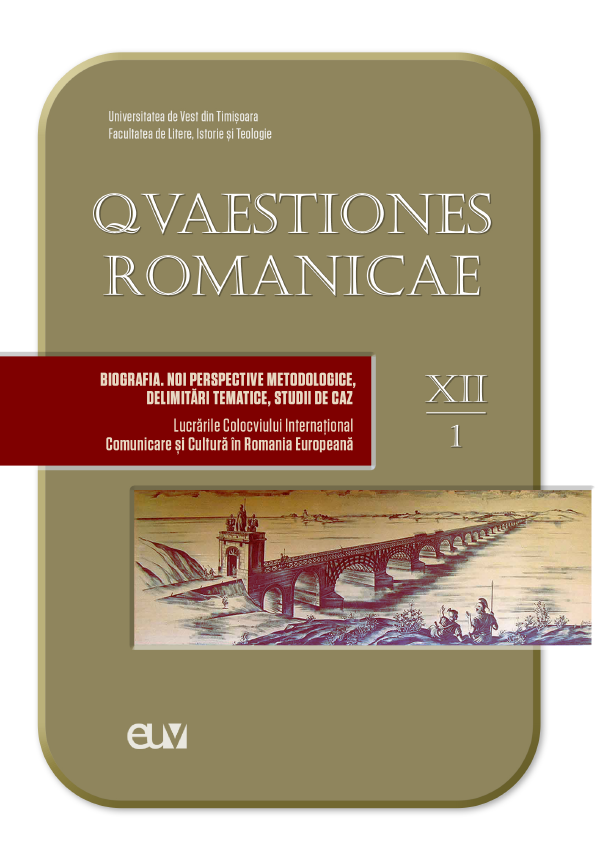Activitatea Micii Înţelegeri în al doilea trimestru al anului 1933, oglindită în paginile ziarului bănăţean „Vestul”. Studiu de caz: aprilie 1933
Abstract: (The activity of the Little Understanding in the second quarter of 1933, mirrored in the pages of the Banat newspaper <The West>. Case Study: April 1933) Also known as the Little Entente, the Little Understanding represented a defensive political organization, actually an alliance between Czechoslovakia, the Kingdom of Serbian-Croat-Slovene and Romania, established in 1920-1921. The above-mentiones alliance aimed to maintain the territorial integrity of its members, both in the face of Hungary's revisionist claims and the tendencies to restore the Habsburgs to the Hungarian throne. During 1933, the relations between the members of the alliance became closer. Founded by the national-peasant leader from Banat, Sever Bocu, the West newspaper addressed, in its pages, and during the period studied, various aspects regarding the external context, primarily European, but also the relations within the Little Understanding or the Romanian-Yugoslav bilateral relations, Romanian-Czechoslovak and Czechoslovakian-Yugoslav. There were clear differences in approach, starting from the intimate conviction of the founder of the aforementioned publication that the entire historical Banat should return to Romania after the First World War, in accordance with the provisions of the Political Convention signed with the Entente in August 1916. The above-mentioned newspaper was also concerned with some aspects of the activitiy of the Little Entente in April 1933, in a very turbulent internal and external context, but also with other issues of utmost importance: Yugoslavia's position in relation to the challenges undertaken at its borders; the attitude of the Little Entente and Poland towards the Directorate of the Four Great Powers (Germany, Italy, France, Great Britain); the process of the Hungarian optants from Yugoslavia at the Hague Court; mutual Romanian-Yugoslav visits, at the highest level.
Keywords: Little Understanding, Poland, Directorate, Banat,”the West”.
Rezumat: La nivel european, al doilea trimestru al anului 1933 consemna, în special, consolidarea regimului naţional-socialist, în Germania. Cunoscută şi sub numele de Mica Antantă, Mica Înţelegere a reprezentat o organizaţie politică defensivă, de fapt o alianţă între Cehoslovacia, Regatul Sârbo-Croato-Sloven şi România, constituită în anii 1920-1921. Alianţa amintită mai sus a avut, drept scop, menţinerea integrităţii teritoriale a membrilor săi, atât în faţa pretenţiilor revizioniste ale Ungariei, cât şi a tendinţelor de restaurare a Habsburgilor pe tronul Ungariei. În cursul anului 1933, relaţiile dintre membrii alianţei au devenit mai strânse. Fondat de liderul naţional-ţărănist bănăţean Sever Bocu, ziarul Vestul a abordat, în paginile sale, şi în perioada studiată, diverse aspecte privind contextul extern, în primul rând european, dar şi relaţiile din cadrul Micii Înţelegeri ori raporturile bilaterale româno-iugoslave, româno-cehoslovace şi cehoslovaco-iugoslave. Existau diferenţe clare de abordare, pornind de la convingerea intimă a fondatorului publicaţiei amintite că întreg Banatul istoric trebuia să revină României după Primul Război Mondial, în conformitate cu prevederile Convenţiei politice semnate cu Antanta, în august 1916. Cotidianul amintit mai sus s-a preocupat şi de unele aspecte ale activităţii Micii Antante în luna aprilie 1933, într-un context intern şi extern foarte agitat, dar şi de alte probleme de maximă importanţă: poziţia Iugoslaviei faţă de provocările întreprinse la frontierele sale; atitudinea Micii Înţelegeri şi a Poloniei faţă de Directoratul celor Patru Mari Puteri (Germania, Italia, Franţa, Marea Britanie); procesul optanţilor unguri din Iugoslavia la Curtea din Haga; vizitele reciproce româno-iugoslave, la cel mai înalt nivel.
Cuvinte-cheie: Mica Înţelegere, Polonia, Directorat, Banat, „Vestul”.
